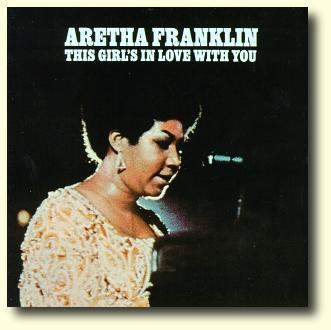What do you get when you combine the second-best guitarist of all time according to Rolling Stone, the No. 1 Queen of Soul (sorry, Tina, but Beyonce had it wrong) and the musical composition ranked No. 41 on Rolling Stone's list of the best rock and roll songs of all time?
One heck of a cover, that's what.

Put out shortly after The Band released what became its signature song in 1968, Aretha Franklin's version of "The Weight" appeared on her This Girl's in Love With You (1970) LP – an album that mostly included Franklin's take on pop songs of the period, including the title track, "Son of a Preacher Man," "Let It Be" and "Eleanor Rigby."
Recorded during the heyday of the Muscle Shoals sound in the Alabama studio where Otis Redding, Booker T. and the MGs and Wilson Pickett all but pitched a tent in the main room, the song features a slide guitar performance from a full-time studio employee at the time: Duane Allman.
Play "The Weight" by Aretha Franklin (featuring Duane Allman)
 While Jimi Hendrix (No. 1 on the Rolling Stone list, by the way) is generally credited with being a black musician who built a bridge to white audiences, few seem to realize that Allman started out doing the same thing in reverse.
While Jimi Hendrix (No. 1 on the Rolling Stone list, by the way) is generally credited with being a black musician who built a bridge to white audiences, few seem to realize that Allman started out doing the same thing in reverse.To be sure, the FAME recording studio was a multi-racial oasis in the 60s. Booker T and the MGs were one of the first bands to include black and white musicians. Atlantic Records honcho Jerry Wexler was behind the boards on many of the Franklin and Pickett sessions. But in the days before his band defined the genre known as Southern Rock, Allman's awesome talent seemed uniquely suited for this kind of work.
Hired in 1968 by studio owner Rick Hall, who was blown away by the young guitarist's talent, Allman played with almost every soul legend who walked through those doors. His solo on Wilson Pickett's "Hey Jude" apparently first brought him to the attention of Eric Clapton. Allman not only knew how to play the guitar, but how to redefine its sound while also working seamlessly with the great tracks being recorded in the studio.
As for "The Weight," which The Band had recorded and released in 1968 before they even called themselves "The Band," this version hit No. 3 on the R&B charts in 1969 and No. 19 on the pop charts. Wexler, in retrospect, dismissed the song as a mistake.
"I was trying to make a bridge over to the 'flower children'; I bitterly regret having done 'The Weight' with her. The song is totally incomprehensible to her basic rhythm & blues constituency. Aretha cannot have a big hit unless it is also a hit with her black audience. It's got to be both, so this is where commercial stupidity and greed got the upper hand with me."
– From the liner notes to the CD's rerelease (thanks to the excellent Band fan site for unearthing this quote)
I beg to differ because, musically at least, I've always viewed this song as being a comfortable fit with classic R&B/gospel. So did director Martin Scorsese, whose relationship with Band guitarist and composer Robbie Robertson was documented in Sunday's post. After filming the final concert documented in The Last Waltz (1978), Scorsese decided that one genre of American music was missing from the film: Gospel. So he put together The Band in a film studio with The Staple Singers and they performed "The Weight" for what was one of this great film's true highlights.

What you might not realize is that, years before the movie, The Staples had recorded their own version of the song with Booker T and the MGs for the rare 1968 album, Soul Folk in Action. Once again, though the lyrics are a little on the hippie side, the music itself sure isn't.
Play "The Weight" by The Staple Singers




No comments:
Post a Comment